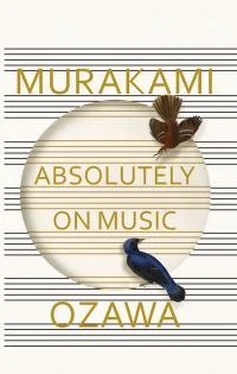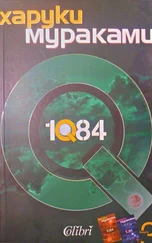I hope with all my heart that Ozawa continues to give the world as much “good music” as he can for as long as possible. Like love, there can never be too much “good music.” The number of people who use it as a fuel to recharge their appetite for life is beyond counting.
Here I would like to thank Koji Onodera, who helped in many ways with the editing of this book. Because my own technical knowledge of music is limited, I benefitted greatly with regard to both terminology and factual information from the advice of Mr. Onodera and his deep familiarity with classical music.
HARUKI MURAKAMI
First Conversation
Mostly on the Beethoven Third Piano Concerto
WE HAD OUR first conversation on November 16, 2010, in my home in Kanagawa Prefecture, to the west of Tokyo. Together we simply pulled LPs and CDs off my shelves and talked about the music as it played. My plan for each session was to keep the discussion from wandering by setting a tentative theme. The central topic for our first session was the Beethoven Third Piano Concerto in C minor. We got to this by way of discussing the Gould and Bernstein performance of Brahms’s Piano Concerto no. 1 that he had mentioned to me earlier, but it so happened that Ozawa was scheduled to perform the Beethoven with Mitsuko Uchida the following month in New York.
In the end, due to a chronic back problem aggravated by the long flight and to a case of pneumonia brought on by the severe cold wave that struck New York that winter, Ozawa unfortunately had to cede the baton to a replacement, but on this particular afternoon we were able to spend a full three hours in a conversation that centered on the concerto. We took occasional breaks to prevent Ozawa from tiring and enable him to take in the periodic nutrition required by his medical condition.
Beginning with
the Brahms Piano Concerto no. 1
MURAKAMI: I remember you once told me about a 1962 performance of the Brahms Piano Concerto no. 1 by Glenn Gould with Leonard Bernstein conducting the New York Philharmonic. Before the performance, Bernstein turned to the audience and briefly announced that they were about to play the concerto according to Mr. Gould’s interpretation, with which he did not agree.
OZAWA: Yes, I was there. As Lenny’s assistant conductor. All of a sudden, before they started playing, Lenny came out on the stage and started talking to the audience. I couldn’t catch his English, so I asked the people around me what he was saying, and I got the general idea.
MURAKAMI: The speech is included in this live recording that I have here.
Bernstein’s speech:
Don’t be frightened, Mr. Gould is here. [ Audience titters. ] He’ll appear in a moment.
I’m not, as you know, in the habit of speaking on any concert except the Thursday-night previews, but a curious situation has arisen, which merits, I think, a word or two. You are about to hear a rather, shall we say, unorthodox performance of the Brahms D-minor Concerto, a performance distinctly different from any I’ve ever heard, or even dreamt of for that matter, in its remarkably broad tempi and its frequent departures from Brahms’ dynamic indications. I cannot say I am in total agreement with Mr. Gould’s conception, and this raises the interesting question: “What am I doing conducting it?” [ Audience murmurs. ] I’m conducting it because Mr. Gould is so valid and serious an artist that I must take seriously anything he conceives in good faith, and his conception is interesting enough so that I feel you should hear it, too.
But the age-old question still remains: “In a concerto, who is the boss—the soloist [ audience laughter building ] or the conductor?” [ More laughter. ] The answer is, of course, sometimes one, sometimes the other, depending on the people involved. But almost always, the two manage to get together by persuasion or charm or even threats [ laughter ] to achieve a unified performance. I have only once before in my life had to submit to a soloist’s wholly new and incompatible concept, and that was the last time I accompanied Mr. Gould. [ Audience roars with laughter. ] But this time the discrepancies between our views are so great that I feel I must make this small disclaimer.
Then why, to repeat the question, am I conducting it? Why do I not make a minor scandal—get a substitute soloist or let an assistant conduct it? Because I am fascinated, glad to have the chance for a new look at this much-played work. Because, what’s more, there are moments in Mr. Gould’s performance that emerge with astonishing freshness and conviction. Thirdly, because we can all learn something from this extraordinary artist, who is a thinking performer. And finally, because there is in music what Dimitri Mitropoulos used to call “the sportive element,” that factor of curiosity, adventure, experiment, and I can assure you that it has been an adventure this week collaborating with Mr. Gould on this Brahms concerto, and it’s in this spirit of adventure that we now present it to you. [ Sustained applause. ]
OZAWA: That’s it, that’s it. But you know, at the time I felt that saying something like this before a performance was not the right thing to do. I still feel that way.
MURAKAMI: But he does it with so much humor, and the audience, while taken aback, is laughing quite a lot.
OZAWA: Well, sure, Lenny was such a good talker.
MURAKAMI: And there’s nothing grim about the speech. He just wanted to make it clear beforehand that it was Gould’s wish to set the tempo, not his.
The music begins.
MURAKAMI: Hmm, it is slow, isn’t it? Kind of strange. I can see why Bernstein wanted to explain himself to the audience.
OZAWA: This part is clearly in large duple time, two beats with the counts one two three/ four five six. Lenny is conducting this as six beats because duple would be too slow to maintain a consistent interval between beats. He has no choice but to conduct with six beats. Usually it’s one and and/ two and and, conducted as one … two … Sure, there are lots of different ways to do it, but just about everybody does it like that. Here, though, at this slow tempo, he couldn’t maintain a consistent interval between beats, so he has to go one two three/ four five six. That’s why the flow isn’t right and tends to get bogged down like this.
MURAKAMI: How about the piano?
OZAWA: I’m sure it’ll be the same.
The piano part begins (4:29).
MURAKAMI: Really, the piano is slow, too.
OZAWA: Yes, but it sounds perfectly fine, especially if you’ve never heard anyone else play it. You just assume that’s the way the piece goes. Kind of like a relaxed tune from the countryside.
MURAKAMI: But it must be hard for the performer to stretch it out like this.
OZAWA: Yes. Listen, though. When it gets to this part, you can’t help beginning to wonder.
MURAKAMI: Around here [ the volume grows, the timpani enter (5:18) ] the orchestra sounds as if it’s beginning to come apart.
OZAWA: True. This wasn’t recorded at Manhattan Center, was it? At Carnegie Hall?
MURAKAMI: Right. It’s a live recording from Carnegie Hall.
OZAWA: I thought so. That’s why the sound is so dead. You know, they did a proper studio recording of the performance the next day in Manhattan Center.
MURAKAMI: Of the same Brahms piece?
OZAWA: The same one. But the record was never released.
MURAKAMI: No, I’m pretty sure it’s not available.
OZAWA: I was there for that one, too. As assistant conductor. Where Lenny said in his speech that he could have let an assistant conduct it—that’s me ! [ Laughs. ]
Читать дальше











